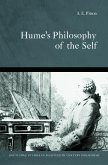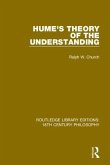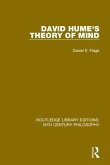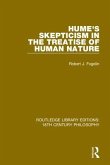This book explores the historical dimension of David Hume's philosophy, a feature that Spencer Wertz calls 'historical empiricism.' According to Wertz, Hume sought to understand the present in terms of the past in a way that anticipates the historical constructionism of R.G. Collingwood and Herbert Butterfield. Hume's method is to tell a story about something's origin in which ideas yield impressions. These impressions eventually yield to experience that includes history as part of its structure. Arguing that Hume worked between history and philosophy, Wertz demonstrates that Hume's historical empiricism consists of four key concepts. These concepts are history, human nature, experience, and nature, all of which play a role in historical narration, taste, moral judgments, and the historiography of science. Bringing new insights to the study of Hume's work, this book will be an important resource for scholars of philosophy.
Hinweis: Dieser Artikel kann nur an eine deutsche Lieferadresse ausgeliefert werden.
Hinweis: Dieser Artikel kann nur an eine deutsche Lieferadresse ausgeliefert werden.








